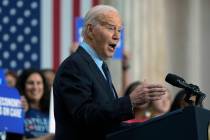Get something done on Internet poker
On April 15, the Justice Department charged the owners of three of the world's largest Internet gaming companies with bank fraud and gambling offenses.
Now online gaming advocates in Washington are attempting to turn the bust to their advantage by renewing a push to legalize online poker in the United States.
The Poker Players Alliance, a lobbying group, argues that the criminal case against PokerStars, Full Tilt Poker and Absolute Poker shows the need for a legalized system.
That effort has drawn growing support from major Nevada casinos that see an opportunity for a lucrative new market.
"We need legislative clarity so that there is a U.S. regulated marketplace for poker," John Pappas, the poker group's executive director, told The Washington Post.
The debate centers on 2006 legislation that effectively bars Internet gaming by prohibiting banks, credit card companies and other financial institutions from processing online gambling transactions.
In the April 15 indictment, federal prosecutors in New York alleged owners and founders of the three poker companies tricked -- or in some cases, bribed -- U.S. banks into processing gambling payments by making them seem as though they were for pet supplies, flowers or other legitimate products. All three of the companies involved are based offshore.
To many advocates of legalization, including executives at Caesars Entertainment Corp. and Wynn Resorts, the case actually provides an opportunity by effectively removing PokerStars and other foreign competitors from the U.S. market. And Senate Majority Leader Harry Reid, D-Nev., agrees.
"I hope we can get something done" on a new legal framework, Sen. Reid told The Associated Press this week.
Good. There is indeed a narrow window of opportunity, here. Poker is booming.
There will always be a few players who risk more than they can afford. But there's a huge market for online poker, and it would be naive to assume someone won't fill it. So, why not take steps now to see that this void is filled by legitimate firms with some experience in detecting and limiting fraud and abuse -- not to mention providing the vast majority of players with the best game at the lowest marginal cost?
The federal government should act quickly to set up a sensible framework under which established, regulated gaming companies can service this market, generating jobs here in Nevada and additional tax revenue for Carson City and Washington from voluntary, elective behavior.
Once it's clear that process is under way, the states -- Nevada, especially -- must position themselves to act quickly when the light turns green, allowing our seasoned local gaming companies to use their established brand names to maximize their share of this booming market.

















